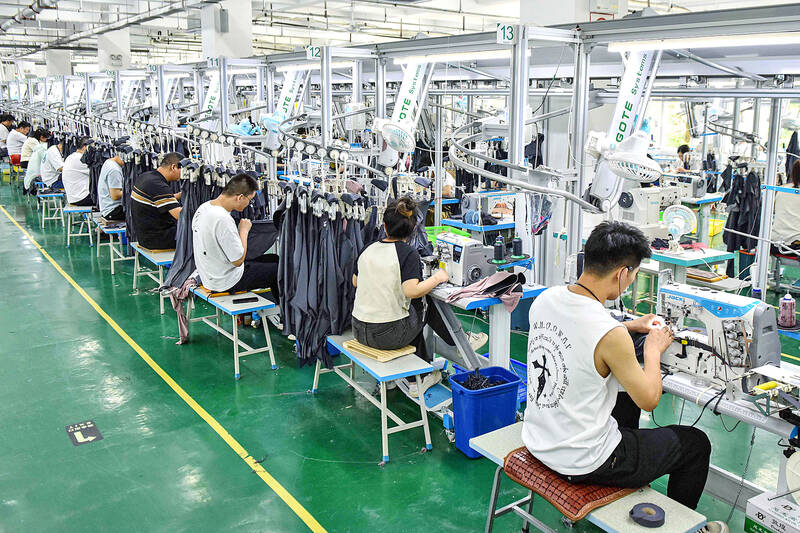China’s factory activity contracted for a second straight month last month, signaling weakness in an area that Beijing is betting on to drive the economy.
The official manufacturing purchasing managers’ index was at 49.5, the Chinese National Bureau of Statistics (NBS) said yesterday. That was the same reading as the previous month and in line with economists’ prediction in a Bloomberg survey. Any number above 50 points is considered an expansion.
A sub-index of new orders at factories inched lower to 49.5 as demand weakened, while a gauge measuring new export orders was unchanged at 48.3.

Photo: AFP
Meanwhile, the non-manufacturing measure of activity in construction and services fell to 50.5, the statistics office said. That compares with a forecast of 51, and a May reading of 51.1.
In a statement accompanying the data, NBS analyst Zhao Qinghe (趙清河) said “the foundation for sustained recovery and improvement still needs to be consolidated.”
Trade tensions have added to the challenges. The US and the EU — two of China’s biggest export markets — have sounded the alarm over a surge in cheap Chinese exports, which they say are unfairly bolstered by Beijing’s massive subsidies. Both have threatened to impose tariffs on China’s electric car exports, along with other sectors where Beijing is leading on price.
The drop in the construction index to 52.3, from 54.4 in May, marked its weakest print since July last year and suggests that state infrastructure spending, a key support for the recovery, lost steam, Bloomberg Economics said. That suggests bolder stimulus might be needed.
“Policymakers will likely focus on fiscal measures to support the economy, given the constraints on monetary easing due to currency pressures,” Guotai Junan International Holdings Co (國泰君安國際控股) economist Zhou Hao (周浩) said.

PROTECTION: The investigation, which takes aim at exporters such as Canada, Germany and Brazil, came days after Trump unveiled tariff hikes on steel and aluminum products US President Donald Trump on Saturday ordered a probe into potential tariffs on lumber imports — a move threatening to stoke trade tensions — while also pushing for a domestic supply boost. Trump signed an executive order instructing US Secretary of Commerce Howard Lutnick to begin an investigation “to determine the effects on the national security of imports of timber, lumber and their derivative products.” The study might result in new tariffs being imposed, which would pile on top of existing levies. The investigation takes aim at exporters like Canada, Germany and Brazil, with White House officials earlier accusing these economies of

Teleperformance SE, the largest call-center operator in the world, is rolling out an artificial intelligence (AI) system that softens English-speaking Indian workers’ accents in real time in a move the company claims would make them more understandable. The technology, called accent translation, coupled with background noise cancelation, is being deployed in call centers in India, where workers provide customer support to some of Teleperformance’s international clients. The company provides outsourced customer support and content moderation to global companies including Apple Inc, ByteDance Ltd’s (字節跳動) TikTok and Samsung Electronics Co Ltd. “When you have an Indian agent on the line, sometimes it’s hard

‘SACRED MOUNTAIN’: The chipmaker can form joint ventures abroad, except in China, but like other firms, it needs government approval for large investments Taiwan Semiconductor Manufacturing Co (TSMC, 台積電) needs government permission for any overseas joint ventures (JVs), but there are no restrictions on making the most advanced chips overseas other than for China, Minister of Economic Affairs J.W. Kuo (郭智輝) said yesterday. US media have said that TSMC, the world’s largest contract chipmaker and a major supplier to companies such as Apple Inc and Nvidia Corp, has been in talks for a stake in Intel Corp. Neither company has confirmed the talks, but US President Donald Trump has accused Taiwan of taking away the US’ semiconductor business and said he wants the industry back

PROBE CONTINUES: Those accused falsely represented that the chips would not be transferred to a person other than the authorized end users, court papers said Singapore charged three men with fraud in a case local media have linked to the movement of Nvidia’s advanced chips from the city-state to Chinese artificial intelligence (AI) firm DeepSeek (深度求索). The US is investigating if DeepSeek, the Chinese company whose AI model’s performance rocked the tech world in January, has been using US chips that are not allowed to be shipped to China, Reuters reported earlier. The Singapore case is part of a broader police investigation of 22 individuals and companies suspected of false representation, amid concerns that organized AI chip smuggling to China has been tracked out of nations such